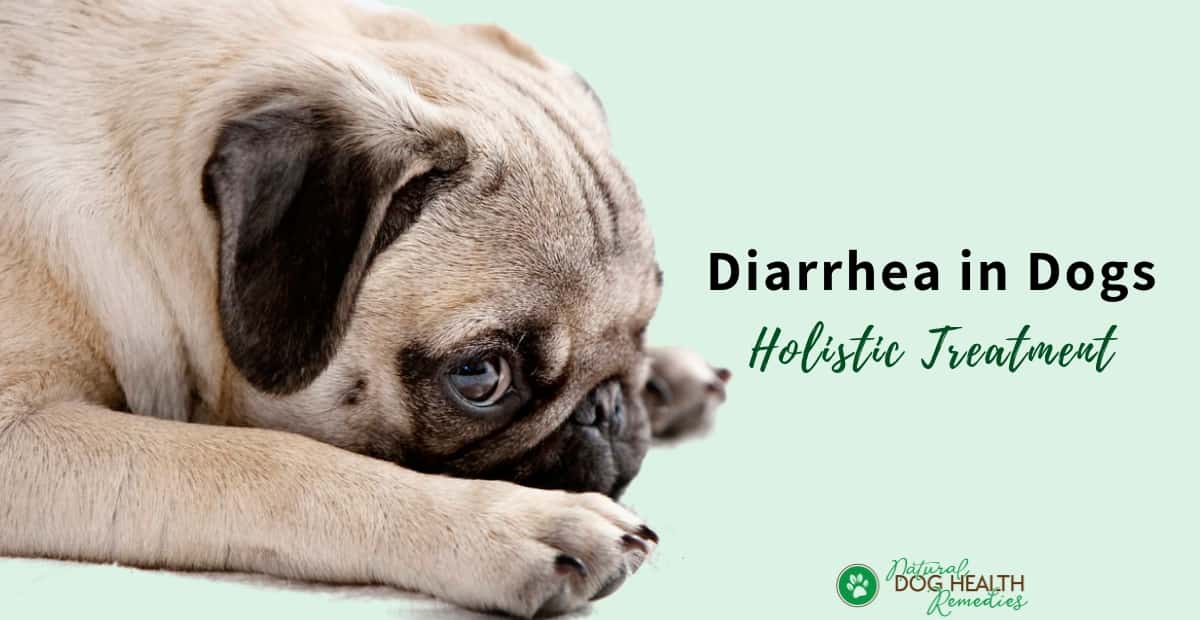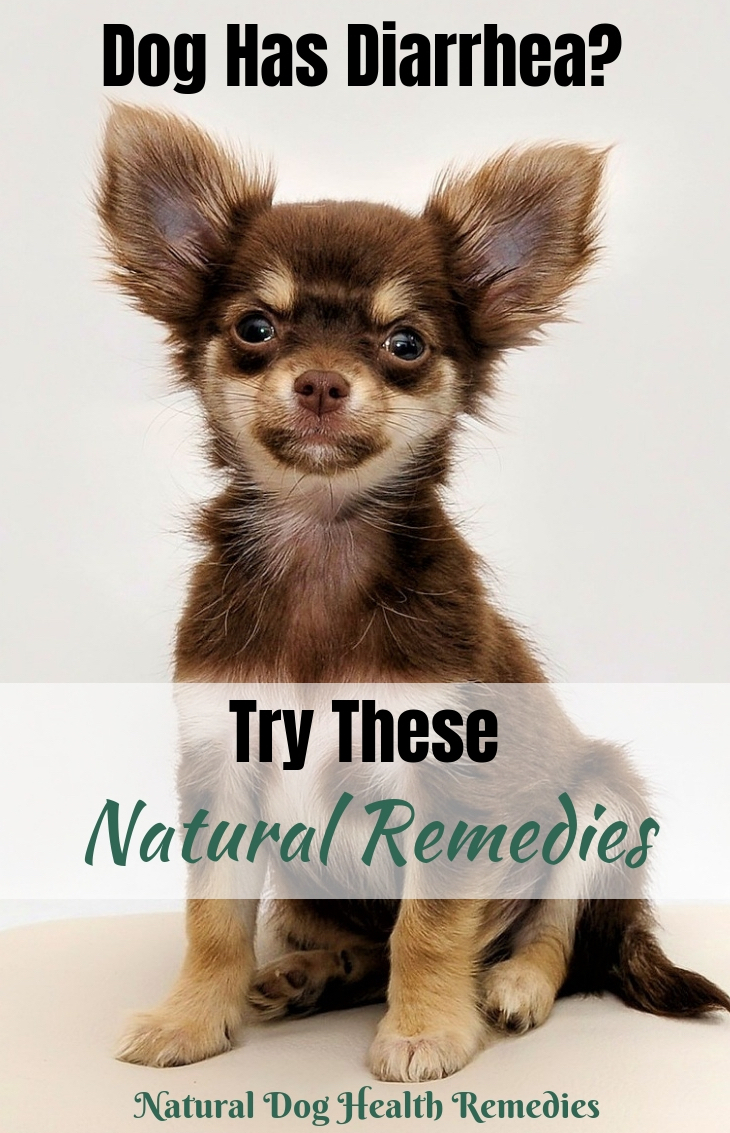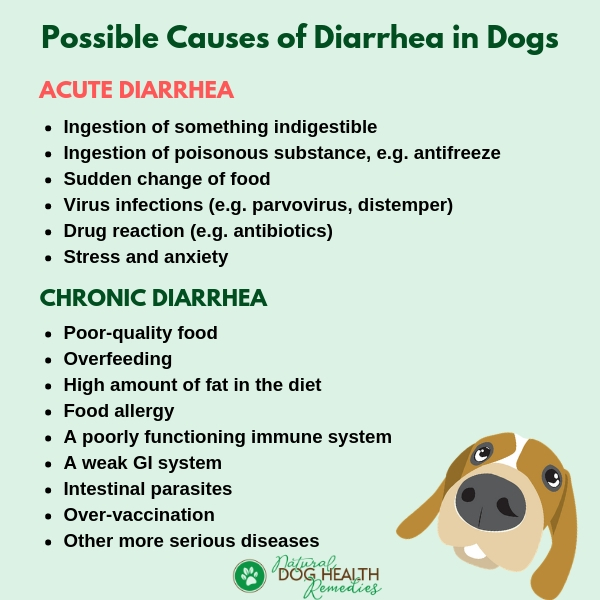Treating Diarrhea in Dogs Holistically
(FTC Disclosure: If you make a purchase via a link on this page, I may receive a small commission, at no added cost to you.)

Overview
Just like humans, diarrhea can affect dogs from time to time.
Acute diarrhea is rather normal and will usually pass in a day or two. It is a nature way for animals (including people) to get rid of unwanted irritants, such as bacteria, viruses, toxic food, or simply things that are indigestible.
As such, acute diarrhea is a healthy, healing process, not a disease. We should not try to suppress the symptom.
At the same time, it is important to keep an eye on our dog's behavior. If she is acting rather normal and looking happy, then there is nothing to feel particularly alarmed about. Just make the necessary precautionary arrangement, be prepared to let our dog go to the bathroom more often, and let nature take its course.
What Causes Diarrhea in Dogs?
Here are some common dog diarrhea causes:
Acute diarrhea:
- Ingestion of something indigestible, e.g. grass, cords, rotten bones from garbage, etc.;
- Ingestion of poisonous substance, e.g. antifreeze;
- Sudden change of food
- Virus infections (e.g. canine parvovirus, distemper)
- Drug reaction (e.g. antibiotics can cause diarrhea in dogs)
- Stress and anxiety, e.g. after spending a night in a kennel.
Chronic diarrhea:
- Poor-quality food
- Overfeeding
- High amount of fat in the diet
- Food allergy
- A poorly functioning immune system
- A weak GI system
- Intestinal parasites (such as worms and Giardia)
- Over-vaccination
- Other more serious diseases such as stomach ulcer, pancreatitis, colitis, inflammatory bowel disease, kidney and liver disease, or stomach cancer
Dangerous Signs & Symptoms in Dog Diarrhea
Take your dog to a veterinarian if she has diarrhea and is showing some of these signs and symptoms:
- acts and looks very sick
- is bloating
- has a fever (Rectal temperatures above 103.5°F)
- is passing bloody stool
- is dehydrated
- is vomiting
Diarrhea causes loss of fluids within the body, which can lead to dehydration, acid-base imbalance or electrolyte interference.
In particular, if diarrhea is accompanied by vomiting, fever and your dog refuses to drink water, this is cause for concern and veterinary attention and treatment is necessary.
Treating Mild Acute Diarrhea in Dogs
 If your dog has mild acute diarrhea but does not show any of the above listed dangerous signs and symptoms, try some of these remedies:
If your dog has mild acute diarrhea but does not show any of the above listed dangerous signs and symptoms, try some of these remedies:
Fast the Dog
Very often, for a case of mild diarrhea, a simple liquid fast for the first 24 to 48 hours will be sufficient treatment.
To avoid dehydration, make sure that your dog drinks a lot of water. One way to ensure your dog has sufficient water intake is to feed her a vegetable broth. Make the broth using vegetables, meat, and rice, but feed only the liquid part to the dog several times a day.
Feed the Dog a Bland Diet
After the liquid fast and when diarrhea stops, you can feed your dog a bland diet of ground turkey with plain canned pumpkin (50:50 ratio) in small amounts 3 to 6 times per day.
Many veterinarians recommend a "bland" diet of ground beef and rice for diarrhea in dogs. But ground beef still has too much fat and may further cause digestive problems.
Although rice contains fiber, it is a grain rich in carbohydrate that tends to ferment - meaning "gas" inside the dog's GI tract. Also, dogs cannot digest grains too well, so it is not recommended to feed rice to dogs who are already suffering from digestive problems like diarrhea.
On the other hand, plain pumpkin (or sweet potato) is high in fiber and easier to be digested even by dogs with diarrhea.
Try These Remedies
You may also consider using this natural remedy -
Only Natural Pet Tummy Support (Affiliate link).
This Tummy Support contains enzymes, probiotics and B vitamins and works quickly to normalize digestion, balance microflora levels and help detoxify the GI tract. Good for dogs with upset tummy and loose stool.
If the condition is more severe, then try giving your dog slippery elm.
Slippery elm is THE herbal choice for diarrhea. It soothes and protects the mucuous membranes and contains precious nutrients.
Use an herbal extract of the herb such as
Animal Essentials Slippery Elm Digestive Herbal Extract Liquid for Dogs (Affiliate link).
Use as instructed on the product label.
Note: If, after 2-3 days on a bland diet, your dog still has diarrhea, then it is time to visit the vet.
Treating Dogs with Chronic Diarrhea
Natural remedies, such as dietary supplements, herbs, and homeopathic remedies, are effective in treating chronic diarrhea in dogs. Please visit this page for more information.

Preventing Diarrhea in Dogs
Diarrhea is not pleasant for both you and your dog, to say the least. To prevent episodes of diarrhea from occurring in your dog, here are a few suggestions:
- Feed your dog a well-balanced all natural diet with all the essential natural supplements such as vitamins, minerals and enzymes.
- Avoid overfeeding your dog, and avoid feeding him table scraps or snacks that contain excessive sugar, fat, and lactose.
- If you plan to change your dog's food, do it gradually. Do not make any sudden changes to his diet. Introduce new foods gradually by adding it to old food. For example, 10% new food added to 90% old food for a few days, then 20% new food added to 80% old food for another few days, and so on.
- Inspect your dog's stool daily for abnormalities such as loose stools, signs of worms, or blood or mucus in stools.
- Put the garbage lid on - Keep your dog away from spoiled food and garbage cans.
 References
References
Eldredge, et al. Dog Owner's Home Veterinary Handbook 4th edition (Wiley Publishing, 2007).
C.J. Puotinen, Natural Remedies for Dogs and Cats (Keats Publishing, 1999).
M.L. Wulff-Tilford and G.L. Tilford, Herbs for Pets (Bowtie Press, 1999).
R.H. Pitcairn, The Complete Guide to Natural Health for Dogs and Cats (Rodale, 2005).





